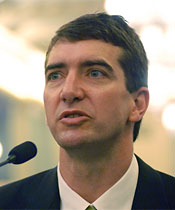Thursdays, 4:30–5:30 pm
6 January–10 March 2011
School of Aquatic & Fishery Sciences
102 Fishery Sciences (auditorium)
1122 NE Boat Street (map)
University of Washington
Reception follows each talk
For more information, contact:
Trevor Branch, 206-221-0776
tbranch@u.washington.edu
courses.washington.edu/susfish
Funding for the Series is generously
provided by Tanya Bevan, friends of Don
Bevan, the UW School of Aquatic and
Fishery Sciences, and NOAA's Alaska
Fisheries Science Center and
Northwest Fisheries Science Center.
Ocean Acidification: Effects on Fisheries and Oceans
27 Jan

Scott Doney
Senior Scientist, Woods Hole Oceanographic Institution
Do the Dollars Make Cents? Economic Impacts of Acidification on Fisheries
Abstract
Many valuable commercial fisheries and aquaculture facilities harvest ocean shellfish (e.g., clams, scallops) and crustaceans (e.g., lobsters, crabs) that form calcium carbonate shells. These animals, along with corals, may be particularly sensitive to changes in seawater chemistry driven by human fossil fuel use. Finfish may also be affected indirectly owing to loss of prey and habitat. Ocean acidification impacts could decrease future fishing revenues and harm communities that depend economically and culturally on marine resources. Further social and economic impacts also could arise from reductions in tourism and recreational values and other ecosystem services.
Bio
Scott Doney is a Senior Scientist in the Department of Marine Chemistry and Geochemistry at the Woods Hole Oceanographic Institution (WHOI). He graduated with a BA in chemistry from the University of California, San Diego in 1986 and a PhD in chemical oceanography from the Massachusetts Institute of Technology/Woods Hole Oceanographic Institution Joint Program in Oceanography in 1991. He was a postdoctoral fellow and later a scientist at the National Center for Atmospheric Research, before returning to Woods Hole in 2002. He was awarded the James B. Macelwane Medal from the American Geophysical Union in 2000, a Aldo Leopold Leadership Fellow in 2004, and the WHOI W. Van Alan Clark Sr. Chair in 2007. His science interests span oceanography, climate and biogeochemistry. Much of his research focuses on how the global carbon cycle and ocean ecology respond to natural and human-driven climate change, which may act to either dampen or accelerate climate trends. A current focus is on ocean acidification due to the invasion into the ocean of carbon dioxide and other chemicals from fossil fuel burning. He is currently the chair of the U.S. Ocean Carbon and Biogeochemistry Program and the U.S. Ocean Carbon and Climate Change Program.
Readings
- Cooley, S.R and S.C. Doney. 2009. Anticipating ocean acidification’s economic consequences for commercial fisheries. Environmental Research Letters 4: doi:10.1088/1748-9326/4/2/024007.
- Cooley, S.R., H.L. Kite-Powell, and S.C. Doney. 2009. Ocean Acidification’s Potential to Alter Global Marine Ecosystem Services. Oceanography 22 (4): 172-181.
- Cooley, S.R., N. Lucey, H.L. Kite-Powell, and S.C. Doney. Nutrition and income from mollusks today imply vulnerability to ocean acidification tomorrow. In Press.